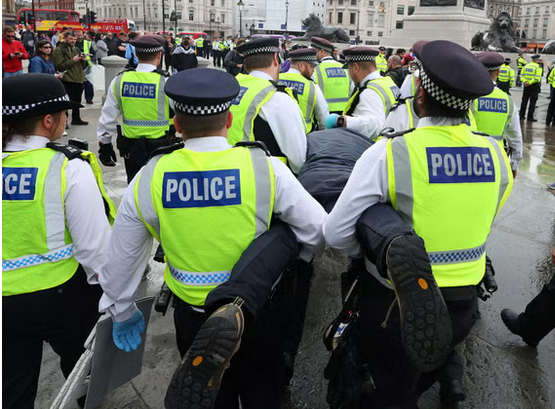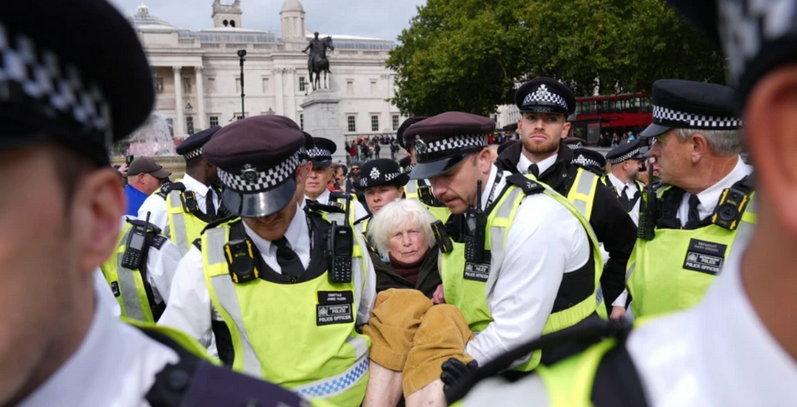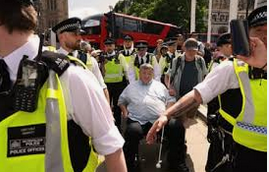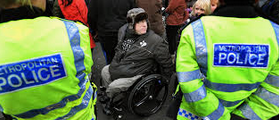Never let a good crisis go to waste

TetleysTLDR: The summary
Britain’s leaders hate the Gaza marchers because they’re peaceful, relentless, and right. Every banner exposes the Government’s complicity in war crimes, the weapons sales, the diplomatic cover, the silence. Every arrest of protesters shows how increasingly wrong footed our Government is. Rather than face that shame, ministers and media use the actions of one deranged individual not connected to any of the anti-Genocide groups to smear a whole movement. Most protesters don’t hate Jews; many are Jewish themselves, demanding justice and an end to bloodshed, anti-semitism is as much frowned upon in the marches themselves as it is elsewhere. But fear has been manufactured, stoked by partisan lobby groups and echoed by compliant broadcasters, to turn solidarity into suspicion. Meanwhile, far-right rallies pass quietly as peaceful marchers are arrested, creating Britain’s first political detainees in decades. The proscription of Palestine Action and heavy-handed policing show how dissent is being criminalised. This isn’t about safety, it’s about power and every crisis, every tragedy, is just another excuse for a Government terrified of the truth.
TetleysTLDR: The article
They hate them because they are embarrassing the hell out of the Government. They hate them because they are peaceful, because every banner and chant shines a light straight into the eyes of a Cabinet up to its neck in complicity. These protests expose what ministers would rather bury: that British weapons, British diplomacy and British silence have all helped make Gaza burn. There are senior figures in this Government who have earned the right to explain themselves at The Hague, so for them to claim that peaceful protest is somehow illegal is quite frankly taking the piss. It's obscene. And yes, some parts of the Jewish community that identify closely with the Israeli state dislike these marches too, because they expose the horror being done in Israel’s name, but that discomfort is political, not religious. It comes from seeing crimes dragged into daylight, not from prejudice against a people.


That’s why Palestine Action was proscribed. Whatever you think of their actions or motivations it was never because it was a terrorist organisation, it clearly isn't, but because it made the Government look weak and guilty. Activists exposed Britain’s role in supplying arms and political cover for the bombing of civilians. Now, even with the ban, the embarrassment keeps coming: hundreds of people willing to be arrested, standing up in the face of state intimidation. It’s all very well for ministers to thunder about 'the rule of law,' but it means very little when the same duplicitous bastards are complicit in war crimes - that's against the law too. The difference is that the Government enforces one law and buries the other.
When far-right mobs march through city centres with fascist slogans, the police line is thin, the arrests minimal, the coverage mild. But when families, students, pensioners, the disabled, trade-unionists and clergy take to the streets calling for a ceasefire, the response is militarised: kettling, mass arrests, surveillance the kind of policing reserved for enemies of the state, not citizens exercising a democratic right. Hundreds of peaceful protesters have now faced arrest and prosecution simply for refusing to stay silent about Gaza. For many, it marks the return of political detainees to Britain for the first time since the peace process in Northern Ireland. That’s what happens when conscience collides with state convenience. The same culture of overreach haunts armed-police operations too. The speed with which lethal force is sometimes used raises hard questions about training, accountability and the value placed on human life. When suspects are killed before any evidence is tested, we lose not only lives but the chance to learn what truly happened. We will never know the perpetrators true motives, his criminality, his mental health because he'll never have his day in Court to face justice. Shoot-to-kill may tidy up a headline, but it leaves democracy a little poorer every time it’s deployed. And lets not even mention the elephant in the room: the deafening silence in the media about how one of the worshippers was actually killed by a police bullet and others were injured by the police in the crossfire.
Now the police are claiming the protests are 'exhausting' them. Spare us the violins. Nobody forced you to treat peaceful demonstrations like military operations, to kettle pensioners and students, or to throw half the force at people carrying banners instead of tackling real crime. Rowley knows as well as anybody that this is a bad law yet he still sends his forces out to mass arrests. If the police are tired, it’s not because of the protesters, it’s because they’ve been made the front line in a political war against conscience.

Every time the streets fill with people demanding justice for Gaza, Downing Street hears a threat to its own legitimacy. And so it should. Every week of marches proves that ordinary citizens can see through the spin, and that truth is the one thing they can’t legislate away. You can arrest a pensioner and use five police officers to carry them away, what you can't arrest is an idea.
Sources & Further Reading
- Liberty (2024). Policing Protests: How New Laws Are Silencing Dissent.
Analysis of the Police, Crime, Sentencing and Courts Act 2022 and Public Order Act 2023, detailing their impact on the right to protest.
https://www.libertyhumanrights.org.uk - Amnesty International UK (2024). Britain: Peaceful Protest Under Threat.
Summary of the shrinking space for lawful demonstration and cases of disproportionate policing.
https://www.amnesty.org.uk - Human Rights Watch (2024). Israel’s Assault on Gaza and International Humanitarian Law.
Documentation of potential war crimes and the role of international suppliers.
https://www.hrw.org - United Nations Office of the High Commissioner for Human Rights (OHCHR). Universal Declaration of Human Rights, Article 20 & 21.
The legal foundations for peaceful assembly and protest rights under international law.
https://www.ohchr.org - House of Commons Library (2024). Protest Law and Policing Powers in the UK.
A neutral overview of legislation and recent policy changes affecting demonstrators.
https://commonslibrary.parliament.uk - Campaign Against Arms Trade (CAAT). UK Arms Exports to Israel: Government Data Briefing.
Factual summary of export licences and the relationship between the UK defence industry and Israel.
https://www.caat.org.uk - Reporters Without Borders (2024). The Role of Media Framing in Protest Coverage.
Discussion of bias and narrative shaping in mainstream reporting.
https://rsf.org
A bit of shameless self-plugging here. This is www.TetleysTLDR.com blog. It's not monetised. Please feel free to go and look at the previous blogs on the website and if you like them, please feel free to share them.Better still have a look at the back catalogue and catch up on previous blogs at https://www.tetleystldr.com/tetleystldr-blog/tetleystldr-back-catalogue

